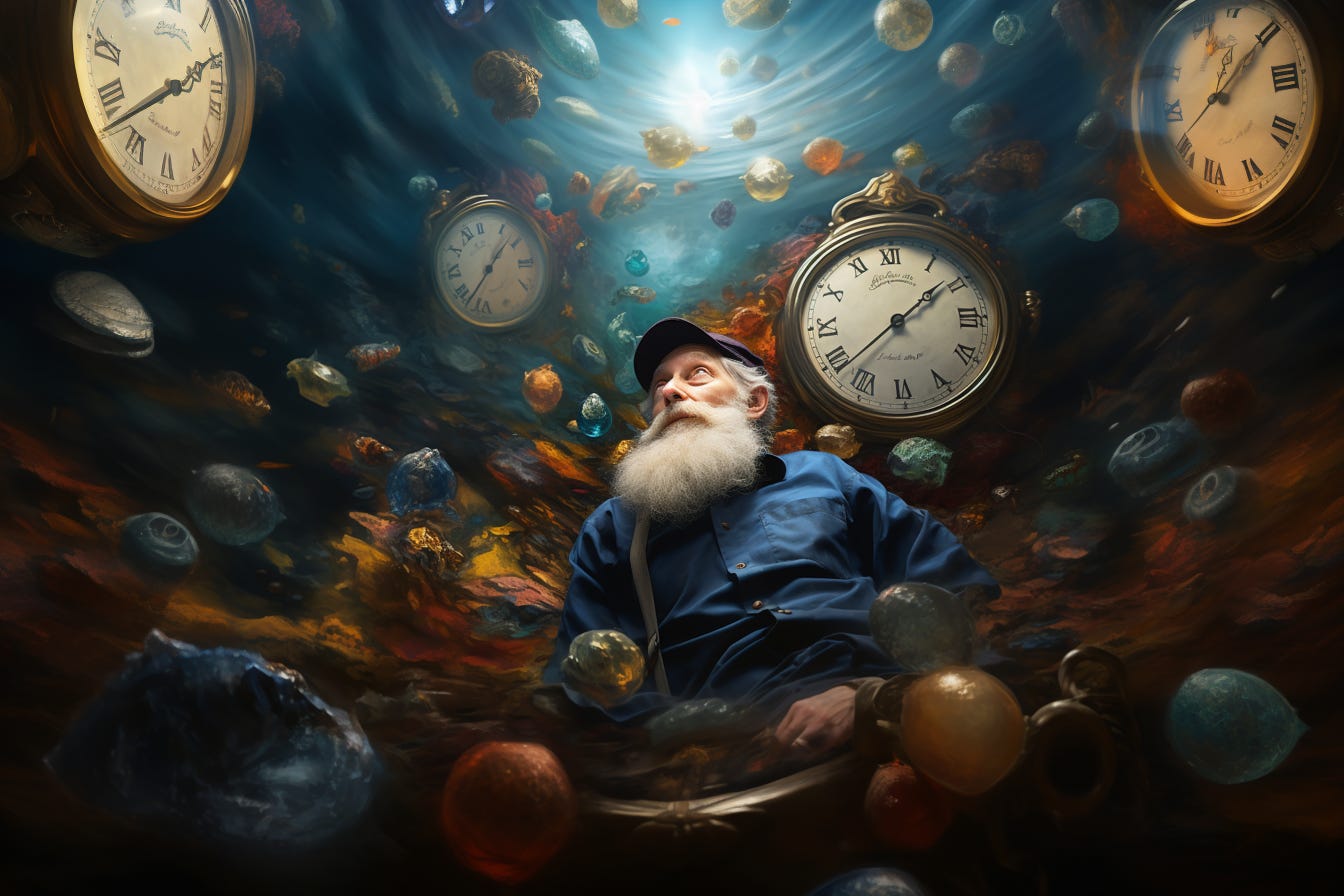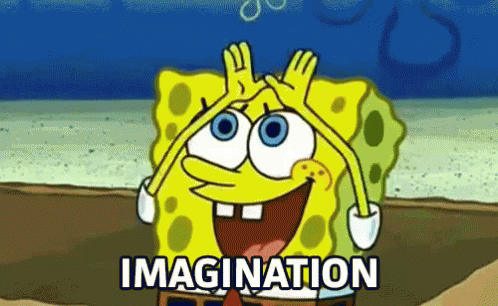We are all hostages to time. Who and what we are in any given moment is but a thin slice of existence, pinned neatly between an unretrievable past and an impenetrable future. And this fading fragment dubbed the present is all we have to call home. Man is utterly tethered to what is now. Current experiences seamlessly slip into intangible memories, and futures elusively shimmer in the haze of what's to come. As if stranded on a now-island, waves of were and will be lap all around but never quite reach the shore.
Is it any wonder, then, that we yearn to glimpse traces of other times permeating our present? But such grasping at the past and future can ferment an unhealthy worldview. Our relationship with personal history can drift into nostalgia, a form of willful amnesia. Like a sterile social media profile, the past we long for is carefully cultivated, cropping or filtering out unflattering moments. And our association with the future can be similarly skewed. People anticipate the 'next step' through rose-tinted glasses as if history naturally bends toward increasing justice and kindness.
In this vein, much of today's culture embraces a simplistic notion of "progress", exalting the supposed arc of history as a consequence of our own virtue. Behavioural economists contend that our choices for our future selves often presume we will be different from what we are today.1
One method of addressing this age-old dissonance is a scorched-earth policy. Forget the past and the future; there is only now! But total immersion in the immediate avoids rather than addresses our existential unease.2 Furthermore, living too fully in the present can take us down a path of unchecked short-term gratification without consideration of future needs or consequences. On a lighter note, it would quickly put all time-travelling fictional characters out of business.

Yet interestingly, Rashi, in this week's parsha, appears to take a similar stance on facing time:
Be wholehearted ( Tamim) with the Lord, your God.
Rashi: Relate to Him with simplicity, depend on Him, and do not inquire of the future; rather, accept whatever happens to you with [unadulterated] simplicity and then, you will be with Him and to His portion.
To worship God with Temimus, he explains, requires staying present without ruminating over what has not yet come to pass or what cannot be changed. Given the critiques we just addressed, a total negation of time seems risky. In addition, Judaism is explicitly aware of more than just what's happening now. Past pains, as well as successes, are constantly commemorated both in the corpus and calendar. God also makes promises for our future, with belief in the messianic era fundamental to our faith.
Clearly, Rashi is more nuanced than how we are currently reading him. I think a better understanding of his commentary on Temimus can be gleaned from a Midrash in Bereishis Rabah. This Midrash cites a verse from Tehillim:
'God knows the years of the complete (Tamim)'.
And adds,...
'Just as they are complete, so are their years complete.'
In other words, the ideal of simplicity is not about denying time but affirming its cohesiveness. Time is no mere succession of separate instants but an interdependent process. Rashi's critique targets how we interpret time as divided, disparate pieces rather than something we must encounter as a whole.
We conceptualise life as proceeding forward in a tidy linear progression, with ourselves existing at an isolated juncture on that line. But this isn't how it works; a more nuanced evaluation reveals a messier, multi-dimensional truth. In reality, we partake in a fluid interchange of meaning that bends both forward and backwards through time. The present is shaped by the past and guided by the future - everything swirls together in a river of entanglements instead of being hermetically sealed one moment from the next.
The mystical commentaries introduce the idea that ‘man is a tree of the field'. The tree symbolises the human condition. When we cut open a tree, we uncover a series of concentric inner circles. Each ring relies on all others for structure and shape, just as moments in our lives find meaning in relation to one another. The slow growth of prosperous years nourishes the constrained circles of difficult times, just as personal proficiency blossoms from seasons of limitation. And even the innermost core, formed so long ago, offers a basis for further unfolding layers. In this way, the tree's architecture reminds us that our very substance is relatedness - where all events, near and far, compose a story that makes what was whole.
So the past retains its dynamism by reverberating into our present choices. It continues to frantically buzz around, manifesting in all the various ways memories, history, and habit influence us. The future beckons us through the hopes and meanings we form through our current actions:
Rather than a succession of atomised "nows," our lives unfold as part of an enduring conversation where past, present and future mutually interpret one another.
Yet once we recognise that we are permanently embedded in a process, a pressing question arises: When are we? What role does God play in this situation? Thinking of ourselves as mere observers carried by unseen forces risks diminishing our capacity for moral choice and positive change. The Lubavitcher Rebbe casts Pharaoh as such an individual who erred by placing himself outside existence's stream. In his dreams, Pharaoh stands on the banks of the Nile, observing it from afar. He saw himself as standing apart from life's flow, a detached spectator to currents not his own.
Similarly, the psalmist's bewildered question, "How could we sing God’s song in a foreign land?" speaks not merely to geography but to the transience of human perception. Read as a question of time he asks: How can we sing God's eternal song in the now? Music is not heard as a series of isolated sounds. Our brains are wired to integrate varying noises into a larger pattern. Even though a melody unfolds gradually, with one note coming after the other, we understand it as a seamless composition. This is analogous to God's aerial view of our seemingly disjointed existences. But how can we wrestle out meaning when we stand on but a single syllable?
And yet, despite the burning impossibility exposed by his question, King David still sang. For the chord to resonate, there must be a unique way we hold a past, present, and future in us. Like some avant-garde performance artist somehow managing to ride a motorbike, balance on a tent, and hold a tiger while jumping through a ring of fire, our fleeting now must juggle all temporal tenses simultaneously. Harmony of this nature requires a state of mind that binds a "now" pregnant with anticipation and memory.

But what is the source of such an ability? Our Sages teach us that:
One hour of repentance and good deeds in this world is better than all life in the World to Come {Pirkei Avos 4:17}
These two tools, repentance and positive deeds show us that we have creative influence over our entire existence in time. Repenting doesn't just erase what came before. It actively rewrites our histories. And in that reinvention of our past selves, we reshape our narratives and alter who we might become. Through positive deeds, we build momentum, thus unleashing a snowball effect that turns history into a primer for our future.
Let's return to Rashi's advice on achieving Temimus. To not worry about the future means not living in the future. Instead, we must live with the future, never negating the now. While the change may seem subtle, such behaviour actually sits in deep tension with escapist future-bound fantasies. These attitudes effectively obliterate history as an arena for God's action. History is unimportant in this seemingly pious perspective; only eternity is sacred. When we live with our future, we understand that God always works in the background. Our daily prayers describe that God 'redeems Israel' in the present tense. He subtly scripts redemption through our daily acts.
To accept what happens to you with simplicity means to see that nothing takes place in isolation as just a single event among an infinite combination of happenings. Taking on occurrences with simplicity is to discern, however dimly, the larger plot of which each episode is but a single scene. It is to intuit that nothing occurs without purpose or meaning, however obscure this may be from our vantage point.
"Time", wrote Jorge Luis Borges “, is the substance I am made of.” It is "a river which sweeps me along, but I am the river." The story is powerfully told that the Vilna Gaon lamented on his deathbed that he would no longer be able to perform the commandments of Tzitzis. He was a man who led a life whose greatness defied comprehension, yet he understood his death would disembed him from the flow of time.
For all its conflicts, time makes us who we are, anchoring us to living out our purpose. God’s mission must define our days as we join future to past through present action. Each era passes into memory, and each memory passes into history. Yet within history's flow, our deeds may send ripples, for good or ill, beyond these brief hours. And to live whilst holding on to this paradox creates the possibility of singing God's song.
Good Shabbos, and Keep Pondering!
This critique was made of an article I wrote a few months back.







As I am not of your faith and constantly must either accept what you say or else look it up, I’ve questioned myself as to why I subscribed. After reading this, which took me longer than it should have, I know why. I am here to learn, and very definitely, I am. I was resistive at first to the idea of being within a thin slice of time and grew into your meaning. This is both an example of fine writing and an intuitive and instructive series of observations that will always be a part of my altered perspective. A comparison to rings within a tree, each affected by the others.
Thank you for this.
Absolutely fabulous piece. This writing reminds me of the way Graham Elliot (one of the judges on Masterchef USA) talks about risotto. He says his favorite thing about the risotto is all the little 'goodies' that you find as you eat it. I love your use of language, each precisely chosen word is like a 'goodie' (or is it 'goody'?) in a risotto.
Aside from the incredible writing talent, I love the way you communicate your thoughts and ideas in such a clear and coherent way. Absolutely brilliant.